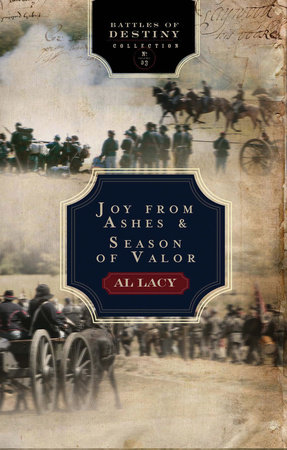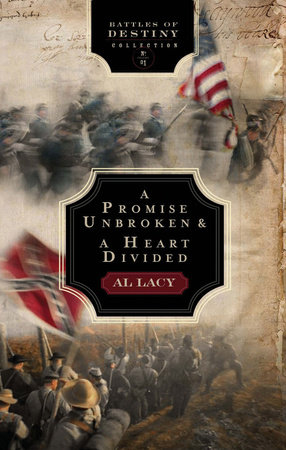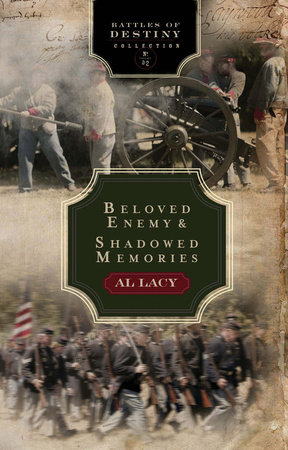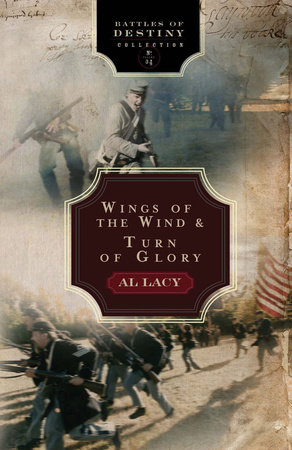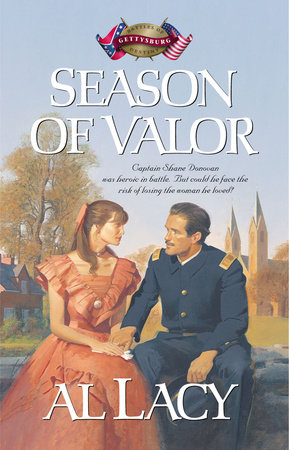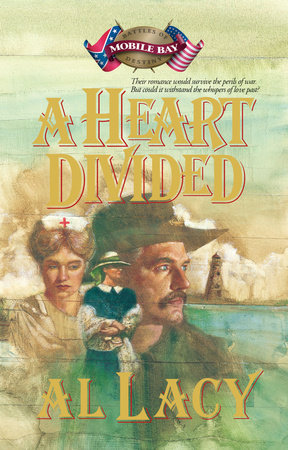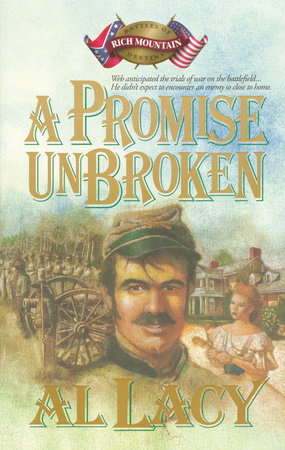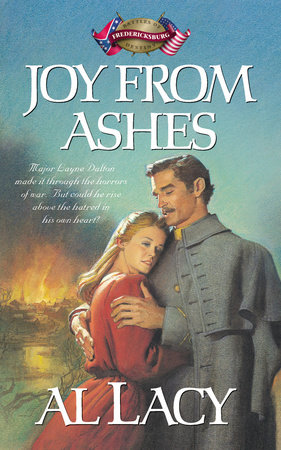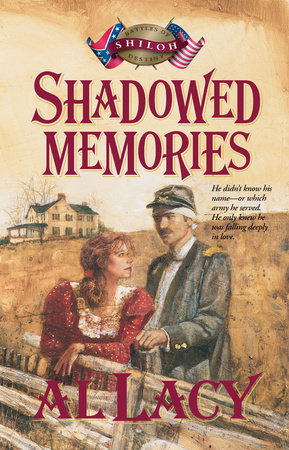Excerpt
Battles of Destiny 2-in-1 Vol. 3
He stood alone outside his field tent, letting his gaze run the length and breadth of the long rows of tents that sheltered his corps from the weather. The night was cold and crisp, and the harsh, vagrant winds sweeping across the snow-crusted fields around Culpeper, Virginia, made him tighten his campaign hat and pull the lapels of his gray overcoat up around his neck.
The stars twinkled like diamonds above him and a half-moon hung sharp and clear-edged as though–on this night at least–a decorative afterthought of the Creator.
It was Sunday night, November 16, 1862. Lieutenant General James Longstreet watched the campfires along the tent rows winking in their struggle for survival, but shortly the winds would extinguish their flames and reduce them to glowing red embers.
Hands shoved into his overcoat pockets, the general pictured his fifty-eight thousand men asleep in their tents, taking their rest. Soon they would find themselves in combat again. The Federals were coming this way. Longstreet would know more what to expect when General Robert E. Lee arrived on Wednesday.
Longstreet had his own ideas. Abraham Lincoln had his sights set on capturing Richmond, the Confederate capital. But what route would the Federals take as they pressed toward their goal? If they came along the east fringe of the Blue Ridge, they would probably angle southeastward between Culpeper and Charlottesville in a direct line toward Richmond. If, however, they came straight south from Warrenton, they might first seize Fredericksburg, which would stand directly in their path.
Longstreet had made a wager with himself. Lincoln would order his new field commander, General Ambrose E. Burnside, to sweep down and capture Fredericksburg. Lincoln had replaced George B. McClellan as commander of the army of the Potomac because of McClellan’s repeated reluctance to move his army quickly when Lincoln ordered action.
Two months earlier, General Lee had led his troops into Maryland, a move Longstreet had openly opposed. Lee and Longstreet were close friends, but the latter had argued against the bold invasion, saying it was foolish to cross into enemy territory when you were vastly outnumbered and outgunned. The Federals would launch a vicious attack simply because Confederate feet were making tracks on Union soil.
Once Lee, backed by President Jefferson Davis, affirmed that the invasion would take place as planned, Longstreet–soldier to the core–ceased to argue. But even as he followed Lee across the Potomac into Maryland on that fateful day in September, Longstreet was silently against it. The foolish scheme stuck in his craw and lay crosswise in his mind.
And now, as he looked back on it, Longstreet knew he had been right. The price paid in lives had not been worth it. The battle at Sharpsburg, Maryland, had left twenty-seven hundred Confederate soldiers dead along the banks of Antietam Creek, not to mention the nine thousand wounded, many of whom died of their wounds during the next three weeks. The Union had also taken six thousand prisoners.
Granted, the Federal forces suffered great losses, too. The Antietam battle had been the bloodiest one-day conflict since the War began. It would have been worse for the Confederacy, however, if McClellan had gone at the Rebel line as Lincoln had commanded.
The battle was a piecemeal affair. At no time did McClellan launch a concerted assault or even employ his reserves. Instead, he wasted his army’s superior strength in a series of fragmentary attacks, using divisions and brigades instead of full corps.
Lincoln’s grievance toward McClellan was that when he had the Confederates beaten, he did not follow through and destroy Lee’s army. To have done so would, in Lincoln’s mind, have spelled the end of the Confederacy. A full-fledged victory by McClellan would have left Richmond vulnerable to imminent capture. The Civil War would have ended.
Instead, Lee’s army had escaped into Virginia’s Shenandoah Valley and had been left in peace for two months. Lee brought in new recruits to replace those he lost on the banks of Antietam Creek, reorganized, and resupplied his forces.
For some time, Lee had been operating with his nine infantry divisions grouped unofficially into two corps under his top commanders–Thomas J. “Stonewall” Jackson and James Longstreet. In October the Confederate Congress approved Lee’s corps organization and created the rank of lieutenant general, to which Jackson and Longstreet were immediately promoted.
In late October the increasingly impatient Lincoln imposed a plan on McClellan: Chase Lee southward, moving along the eastern slopes of the Blue Ridge Mountains and remaining astride his lines of supply. Press him, fight him if an opportunity presents itself…but
beat him to Richmond and capture it.Lee learned of Lincoln’s orders from Confederate spies and immediately sent Longstreet’s fifty-eight-thousand-man corps to Culpeper, placing them strategically in McClellan’s path. He left
Jackson’s corps in the Shenandoah Valley, posing a threat if the Federals came through there on their way to Richmond, rather than from Warrenton. When Lincoln was told by his scouts of Lee’s clever move, he knew it had been possible because of McClellan’s slow deliberation in marching his army. At this juncture, the Federal president made the decision to relieve McClellan of his command.
Word came to the Confederates on November 8 that on the day before, Major General Ambrose Burnside had been made commander of the Army of the Potomac.
Longstreet raised his eyes toward the star-studded sky and felt the smallness its great expanse always gave him. Though he made no claim to being a Christian, the rugged general was no atheist. God was up there somewhere, all right. He wondered if God cared about the thousands of men who lay sleeping in the fields. He reasoned that if God cared about them, He wouldn’t have allowed the War to happen. There had been wars as far back as men have written their history. There always would be. The general had discussed the subject with an army chaplain one time. The chaplain had laid the blame for wars on Satan, the devil, who had inspired Cain to declare war on his brother Abel and shed his blood.
Longstreet wasn’t sure what he believed about the devil, but he knew for sure that there was evil in the world.
The general lowered his gaze to the gurgling creek that flowed nearby, the silvery moonlight reflected on its surface. Longstreet drew in a deep breath and let it out with a sigh made visible by the frosty night air. His mind drifted to his wife and children. He knew they were warm and snug in their beds down in Richmond.
James Longstreet loved his family and missed them terribly. He hadn’t seen them for over six months. “Maybe one day soon,” he said aloud. “Maybe one day soon this war will be over, and we can be together again.”
He wheeled about and entered his tent. He laid his hat on the small table that served as a desk and removed his overcoat, then sat down on the straight-backed wooden chair and removed his boots. He blew out the lantern and slid into his bedroll. Sunrise the next morning came as no surprise. Longstreet was forty-one years old, and he had never known daylight to fail to come on schedule in all those years. He had recently read Charles Darwin’s new book,
On the Origin of the Species by Means of Natural Selection. Ignoramus. No, God was up there, all right. He made the whole universe and was keeping the earth in its orbit. No accident. Purpose and design in the universe by its Creator and Designer.
Longstreet left his warm bedroll and pulled on his boots. He
could hear the activity of the camp as he shouldered into his overcoat
and donned his campaign hat. He stepped out into the snappy
morning air and filled his lungs. Men who milled about their tents
nearby greeted him cheerfully. Though they smiled, he knew that behind
those smiles were concerns about when and where the next
battle would take place…and whether they would survive it.
Longstreet saw Corporal Ted Landrum hastening toward him from the cook’s tent, carrying a tray of steaming food.
“‘Mornin’, General,” grinned Landrum as he drew up. “Your breakfast, sir.”
Longstreet smiled, opened the flap, and allowed Landrum to enter the tent ahead of him. Landrum placed the tray on the table and turned his boyish face toward the tall, full-bearded man. “Anything else I can do for you, sir?”
“No. Thank you, corporal. I’ll set the tray outside when I’m finished. You can pick it up later.”
“Yes, sir. Ah…General, sir…do we have any word yet about which route the Yankees may be taking?”
“Not yet. General Lee will be here day after tomorrow. Maybe he’ll have something to tell us by then.”
“Yes, sir. It’s…it’s just the waiting, sir. The men are jittery.”
“I am, too,” grinned Longstreet. “Guess we’ll just have to jitter until the Yankees make their move, eh?”
“Guess so, sir,” replied the corporal.
The wind had subsided some since sunrise, but it was still stiff and cold enough to make Longstreet keep his tent flap down. He was just finishing breakfast when he heard footsteps draw up outside, and a sturdy male voice call, “General Longstreet, sir?”
The general grinned to himself. A
familiar sturdy voice. He picked up the tin cup that held one more swallow of coffee and said, “Come in, Major.”
The flap opened and Longstreet looked up to see Major Layne
Dalton enter, holding a small bundle of envelopes. “Mail boy at your
service, sir.”
The general set admiring eyes on the young major and downed the last of the coffee. Layne Dalton, an 1855 graduate of West Point, had served in the regular United States army as a lieutenant until the day after the Civil War began in April 1861, when he resigned from his post near Washington, D.C., and returned to his home at Fredericksburg, Virginia. A week later, he signed up in the Confederate army at Harper’s Ferry, Virginia, and was taken in with the rank of lieutenant.
Shortly thereafter, Dalton was assigned to serve under Longstreet, and had served with him in several different divisions ever since. The rugged young officer had been at Longstreet’s side in the First and Second Battles of Bull Run, Peninsular Battles, the Seven Days’ Battles, and at the Battle of Antietam. He had distinguished himself under fire in every battle and had proven to be an able leader of men. Because of this, Longstreet had seen to it that he had been promoted to captain in July 1862, after the Seven Days’ Battles, then had contacted Richmond after Dalton’s outstanding valor at Antietam in September, recommending that he be promoted to major.
Longstreet chuckled at Dalton’s sly humor and accepted the bundle of envelopes. “Thank you, mail boy. Anything interesting in this stack?”
Dalton grinned. “I believe you will find the one I placed on top to be of interest, sir. It’s from Mrs. Longstreet.”
The general’s eyes sought out the handwriting on the top envelope. It was written by the hand of the woman he loved, all right. He raised his gaze to the major and smiled. “I’ll…ah…read it in private.”
“I understand, sir. Sir…”
Longstreet’s heavy eyebrows arched. “Yes?”
“Sir, I received a letter from
my wife in today’s mail, too. I…”
“Something wrong? Don’t tell me Melody’s having a problem in her pregnancy.”
“No, sir.”
“Thank God for that.”
“Yes, sir.”
“I can’t remember when you first told me about it. How far along is she now?”
“Seven months. Doc Craig says she’ll deliver about January 15.”
“Well, I can see something’s got you upset…something in her letter?”
“Yes, sir. Since we’re only thirty miles from Fredericksburg, General, I need to ask your permission to make a quick ride home.”
Longstreet’s brow furrowed. “You seem a bit reluctant to tell me the content of the letter, Major. If I’m going to grant you time to ride to Fredericksburg, I’ll have to know why you need it…and so will General Kershaw, since you’re in his division.”
Dalton cleared his throat, nodding. “Yes, sir. You see…my father-in-law, Jack Reynolds, is to stand trial for murder at the court-house in Fredericksburg tomorrow. The family needs me. Especially Melody. She’s very close to her father, and if he’s convicted, he will hang within a day or two after the trial.”
Longstreet’s expression froze, eyes unblinking. “Do you know the details?”
“Yes, sir. Melody wrote it all in the letter.”
“Let me say right off that you have permission to go. But because of your rank, I’ll have to know the details in case some unforeseen complications come up.”
“I understand, sir. It’s just that…well, a murder trial in the family isn’t something a man wants to let out, even though I believe my father-in-law is innocent.”
“I can sympathize with that, Major.”
“Well, sir, it’s sort of a long story, but I’ll try to make it as brief as possible.”
The general gestured toward a chair in the over-sized tent. “Sit down,” he said. “I’ll put this tray outside, then we won’t be bothered over it, at least.”
Once both men were seated, Major Dalton began his story.
The man Dalton’s father-in-law was accused of murdering had been a long-time resident of Fredericksburg, Edgar Heglund. There had been bad blood between the Heglunds and the Reynoldses for over forty years–ever since Edgar Heglund, who was fourteen at the time, had shot and killed Jack Reynolds’s dog claiming, mistakenly, that it had killed all of the Heglunds’ chickens. From that time on, there was continuous trouble between them. When the two young men married and had families, the trouble did not subside.
Edgar and Ethel Heglund had five sons–Steve, Clyde, Everett, Keith, and George. Jack and Frances Reynolds had two children, Jack Jr. and Melody. As the years passed and the offspring of both families were growing up, the Heglund brothers–led by Steve–tormented Jack Jr. and Melody. Neither Edgar nor his wife ever disciplined their sons for their wrongdoing.
When they were in their mid-teens, Jack Jr. happened to run onto Steve without his brothers. Though Steve was somewhat bigger, Jack gave him a royal whipping. Steve ran to his parents and told them Jack Jr. and several of his friends had jumped him and beaten him up.
Edgar went to the Reynolds place with fire in his eyes, demanding that Jack Jr. and his friends be punished. Jack Jr. was there and said he had whipped Steve all by himself. Edgar went into a rage, called Jack Jr. a liar, and swearing, made a hostile move toward him. Jack Sr. stepped in and cold-cocked Edgar, breaking his jaw.
Things only grew worse between the families after that. Another Reynolds dog–this time Melody’s–was shot one night, along with four of their horses. The culprits were never caught, but everyone in Fredericksburg knew who had done it. The town constable questioned the Heglund boys and their father, but they said they knew nothing about it. There was no evidence to convict them, so nothing could be done.
The next day, Jack Sr. bought four new horses and locked them up in the barn when evening came. About midnight, he discovered that the barn was on fire. Jack was able to get the horses out of the barn safely, but it burned to the ground. When Jack and the constable confronted Edgar Heglund and his sons, they claimed innocence. Ethel claimed her husband and sons were home with her at the time the fire was set. Jack called them all liars and warned them to leave his family and his property alone.
Several months went by without incident. Then Jack and Frances took their teenage son and daughter on a three-day trip to Richmond. When they returned, their house had been broken into. Cabinets were torn from the walls, the kitchen stove was filled with mud and manure from the corral, dishes had been shattered on the floor, and furniture all over the house had been destroyed. The worst thing of all was the destruction of Melody’s piano.
At six years of age, Melody began to show her parents that she was properly named. Her inborn talent for music began to surface. The Reynoldses were poor–Jack was a cobbler–but they wanted their daughter’s talent to be developed. They managed to scrape up enough money to pay for piano lessons, and their neighbors were nice enough to allow Melody to use their piano for practice.
They also began to put money away so they could buy their daughter her own piano. It took a long time, but they finally were able to purchase a used upright in Richmond, and presented it to her on her thirteenth birthday. Seven months later, the Heglund brothers destroyed the piano when they broke into the house.
Once again the town constable was called in, and this time he found incriminating evidence–a receipt from Fredericksburg’s general store. Steve had made a purchase for the family and was carrying a copy of the receipt, which had his signature on it. Somehow while he was tearing up the Reynolds house, it dropped out of his pocket. When the constable confronted Edgar Heglund with the evidence, he had no choice but to call his sons before the constable. The youngest Heglund son, George, had not been in on it, but Steve, Clyde, Everett, and Keith had no choice but to admit their guilt.
The constable severely reprimanded the four brothers, then gave Edgar a choice–pay fully for the damage or have his sons face trial. The money was paid.
The constable warned the Heglunds to stay away from the Reynolds home and not to bother any of them at any time or any place. Another used upright was purchased for Melody, and the Reynoldses went on with their lives.
A couple of years went by with only hard looks between the two families when they met on the streets of Fredericksburg. Then in the spring of 1854, when Jack Jr. was nineteen, he didn’t come home one night. His body was found washed up on the bank of the Rappahannock River the next morning. He had been bludgeoned to death with a heavy instrument and his body thrown into the river.
Though the constable and the townspeople suspected Steve Heglund and his brothers, there was no hard evidence and no charges were brought against them.
The Reynolds family grieved over their loss, and knew in their hearts that the Heglund brothers murdered Jack Jr., but there was nothing they could do about it.
Footsteps were heard outside the tent, followed by the voice of Colonel Dwight Conley. “General Longstreet, sir…I’m sorry to disturb you, but we have a matter of utmost importance that only you can handle. It will only take a few moments.”
Rising, the general answered, “Certainly, Colonel. Be right with you.” He turned to Dalton and said, “Wait right here, Major. I’ll be back shortly.”


